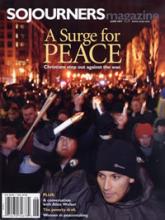The rightward drift of both Catholic and Protestant churches during the past 40 years has left an enormous number of Americans with the feeling that their church doesn't speak for them. But if we're honest, we can't pin all the blame on conservative clergy. The Religious Left has silenced itself. That part of the faith community that inspired the labor movement, marched against segregation, opposed the Vietnam War, and brought moral authority to America's efforts to fight poverty has all but disappeared from the national political discourse.
The results have been catastrophic. The values that used to animate the progressive movement—the notion that we share a responsibility to one another, that we were, in fact, our brother's keepers—are steadily eroding. One in every five American children starts his or her life in poverty. Our grandparents are being driven into bankruptcy because of prescription drug bills. And corporate executives are pulling down salaries in the tens if not hundreds of millions while cutting the health benefits and pensions of their employees. And yet, where is the righteous anger? Where are the calls to remember our responsibility to one another as children of the same God? While religious leaders obsess about the perceived sexual sins of others, where are our Ezekiels to remind us that "this was the guilt of your sister Sodom: She and her daughters were arrogant, overfed, and unconcerned; they did not help the poor and needy."
Sometime in the late 1960s and early 1970s, the Religious Left and the secular left got a divorce that weakened both. Because the Religious Left has abstained from the political debate, its moral vision cannot influence law and policy. And because progressive politicians seem reluctant to draw on the rich religious tradition that shaped the history of our country, they lack the moral weight to inspire our nation to reaffirm its responsibilities. …
How can we find our way back?
Read the Full Article
